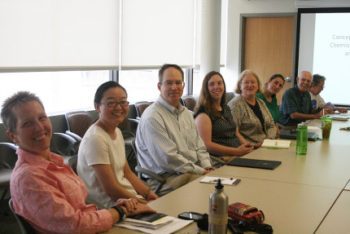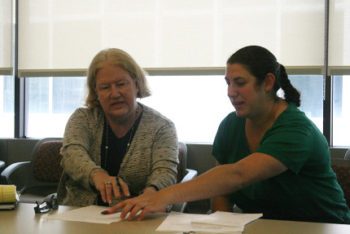Washington University’s Education Research Group (ERG) brings together a diverse group of faculty and staff members interested in research on teaching and learning in STEM (Science, Technology, Engineering, and Mathematics). The group represents an array of fields, including: Biology, Chemistry, Education, Physics, Psychology, Mathematics, Computer Science, and Engineering, as well as the Institute for School Partnership, The Center for Teaching and Learning, and CIRCLE.
 STEM ERG was established in 2008. It follows a laboratory-group model, with individual members presenting upcoming, current, or completed work related to the scholarship of teaching and learning (SoTL). Members may also lead article discussions or present on topical material related to current issues in education research. ERG members offer one another feedback, research suggestions, and ideas for new collaborations. The group meets biweekly during the fall and spring semesters.
STEM ERG was established in 2008. It follows a laboratory-group model, with individual members presenting upcoming, current, or completed work related to the scholarship of teaching and learning (SoTL). Members may also lead article discussions or present on topical material related to current issues in education research. ERG members offer one another feedback, research suggestions, and ideas for new collaborations. The group meets biweekly during the fall and spring semesters.
The ERG founders developed the group in response to a specific need among faculty and staff involved in externally funded education projects to evaluate these projects in a systematic way. The ERG serves another, broader purpose by fostering collegial, collaborative interactions among scholars from different disciplines.
 The STEM Education Research Group has broadened the definition of scholarship at Washington University and raised awareness among the faculty and administration about how faculty, researchers, and staff are conducting scholarship that advances the university’s mission of excellence in both teaching and research.
The STEM Education Research Group has broadened the definition of scholarship at Washington University and raised awareness among the faculty and administration about how faculty, researchers, and staff are conducting scholarship that advances the university’s mission of excellence in both teaching and research.
If you are interested in attending or presenting in ERG meetings, please contact Chris Wally. All with an interest in education research are welcome! For more about the history, structure, and philosophy of the ERG, please consult the following article: Fisher, B. A. and R. F. Frey. (2011). “Adapting a Laboratory-Research Group Model to Foster the Scholarship of Teaching and Learning.” To Improve the Academy 30. 99-111.